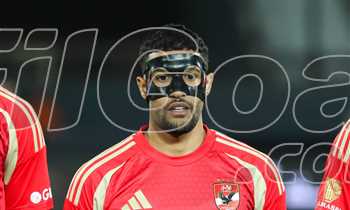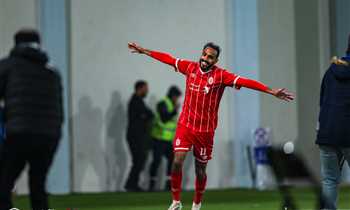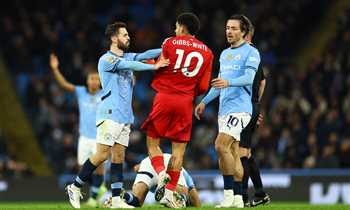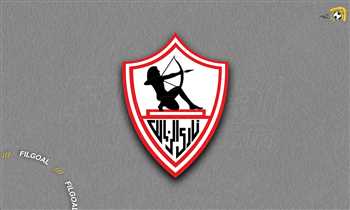
كتب : محمد سبع | الثلاثاء، 14 فبراير 2006 - 12:56
I'm A Believer
Only a month ago, not even the most optimistic Egyptian football fan would have truly believed the Pharaohs would be able to clinch a record-fifth African title, but on what once seemed like a dream materialized in the Cairo International Stadium on Friday February 10th.
Egypt beat Ivory Coast in the final 4-2 to win the African Cup of Nations after a dramatic penalty shootout.
Amid all the celebrations, it's important to highlight the positive and negative aspects of Egypt's title run.
Egypt's title campaign has been more or less a rollercoaster ride for the players, coaches, fans and football officials in the country.
It all began with the below-par performances of the national team in the build-up for the African Cup, which along with a controversial selection by coach Hassan Shehata for the tournament, created a sense of apathy within the Egyptian public.
Not to undermine Shehata's accomplishment, but the Egypt boss' tactics remained under scrutiny throughout the tournament and the team's performances kept the fans on their toes.
Arguably, the highlight of Egypt's problems was the touchline spat between Shehata and striker Ahmed Hossam "Mido" in the semi-final against Senegal.
Shehata chose to substitute the Tottenham striker with the score tied at 1-1, which sent Mido into Tantrum and moved him from a talisman of the Egyptian team to a "public enemy", especially that Shehata's substitution proved justified when Amr Zaki scored the winning goal for the Pharaohs.
Shehata's decision to pull out Mido, with the immobile Emad Meteb giving dismal performances during the tournament, remains a point of disagreement.
Nonetheless, Mido's disgraceful reactions, witnessed by an estimated 4.5 billion viewers worldwide (according to the 2006 Egypt LOC), marred Egypt's win and split the Egyptian public into detractors and supporters of the players cause.
Then came the Egyptian FA's rushed decision to axe the player from the Egyptian camp and suspend him for six months.
And as much as a "disciplinary action" was needed against Mido, the timing was critical because it preceded the African final and put the title campaign in jeopardy due to all the distraction.
However, Mido's suspension remains a brow-raiser since Egypt have no serious, if any, international matches in the upcoming year.
All these incidents combined could have demolished the Pharaohs' continental campaign, yet three important factors were the driving force behind Egypt's African title.
First came the fanatic support provided by the Egyptian fans who were thirsty for the title.
And the second was the spirit and hard work of Egypt's players, who despite the apparent supremacy of their opponents on the tactical and physical levels did not fail their fans and country.
Honorable mentions:
Essam Al-Hadari: It wasn't just Al-Hadari's outstanding performances in the African Cup and his ability to hype up the crowd, but the fact that no one expected much from the Ahli goalkeeper who was previously known for losing his cool in critical situations.
Ibrahim Saied: Once the "bad boy" of Egyptian football and a surprise choice by Shehata for the tournament, Saied established himself as one of the top defenders in the tournament with his tactical superiority and discipline.
Wael Gomaa: The surprise package of the Egyptian team, a truly spirited and charismatic defender who was faced with the toughest task of all, to hinder Africa's top strikers.
The stern defender managed to keep some of the top goal-gett
مقالات أخرى للكاتب
-
Ahli's road to a sixth Champions League title السبت، 15 نوفمبر 2008 - 13:29
-
Keeping the Faith السبت، 09 فبراير 2008 - 21:02
-
Ivorian Terror الإثنين، 04 فبراير 2008 - 13:28
-
Preparing for Sudan الخميس، 24 يناير 2008 - 17:35
نرشح لكم

 خبر في الجول - اتجاه داخل الزمالك لرحيل بيسيرو.. والأسماء المرشحة لخلافته
خبر في الجول - اتجاه داخل الزمالك لرحيل بيسيرو.. والأسماء المرشحة لخلافته

 خبر في الجول - جلسة في منزل لبيب لحسم مصير بيسيرو مع الزمالك
خبر في الجول - جلسة في منزل لبيب لحسم مصير بيسيرو مع الزمالك
 وكيله: الأهلي لم يحدد قراره بشأن تفعيل بند شراء عطية الله.. وهذا موعد عودته
وكيله: الأهلي لم يحدد قراره بشأن تفعيل بند شراء عطية الله.. وهذا موعد عودته
 رئيس البنك الأهلي: لا صحة لرحيل طارق مصطفى لتدريب الزمالك
رئيس البنك الأهلي: لا صحة لرحيل طارق مصطفى لتدريب الزمالك
 عادل بنشرقي.. الجزيري يصل لهدفه الـ43 مع الزمالك
عادل بنشرقي.. الجزيري يصل لهدفه الـ43 مع الزمالك
 مؤتمر بيسيرو: ركلة الجزاء ليست صحيحة.. وهذا موقف مشاركة زيزو مع الزمالك
مؤتمر بيسيرو: ركلة الجزاء ليست صحيحة.. وهذا موقف مشاركة زيزو مع الزمالك
 طارق مصطفى: سأدرب الزمالك ومصر يوما ما.. والأبيض ليس جيدا نفسيا وبدنيا
طارق مصطفى: سأدرب الزمالك ومصر يوما ما.. والأبيض ليس جيدا نفسيا وبدنيا














































